Wohin auch das Auge blicket
Moor und Heide nur ringsum.
Vogelsang uns nicht erquicket
Eichen stehen kahl und krumm.
Wir sind die Moorsoldaten
und ziehen mit dem Spaten
ins Moor!
Sachsenhausen, Stutthof, Dachau,
ponad wamy boży gniew
choćbym sto lat nawet zdychał
mocny, straszny jest mój śpiew
Pójdziemy, niewolnicy,
rycerze w ból zakuci
na bój!
Hej, Treblinko, Auschwitz, Gusen,
serca w górę, w górę pięść!
Niech na druty idą tchórze
Nam nie wolno śmierci chcieć!
I dla nas, niewolnicy,
to samo słonce świeci
co dzień!
Bergen-Belsen, Ebensee,
hlavu vzhůru, vzhůru pěst!
Liberté, liberté chérie,
мы пойдём домой, oh yes!
Dai campi del dolore
rinascerà l'amore,
domani!
Dai campi del dolore
rinascerà l'amore,
domani!
Moor und Heide nur ringsum.
Vogelsang uns nicht erquicket
Eichen stehen kahl und krumm.
Wir sind die Moorsoldaten
und ziehen mit dem Spaten
ins Moor!
Sachsenhausen, Stutthof, Dachau,
ponad wamy boży gniew
choćbym sto lat nawet zdychał
mocny, straszny jest mój śpiew
Pójdziemy, niewolnicy,
rycerze w ból zakuci
na bój!
Hej, Treblinko, Auschwitz, Gusen,
serca w górę, w górę pięść!
Niech na druty idą tchórze
Nam nie wolno śmierci chcieć!
I dla nas, niewolnicy,
to samo słonce świeci
co dzień!
Bergen-Belsen, Ebensee,
hlavu vzhůru, vzhůru pěst!
Liberté, liberté chérie,
мы пойдём домой, oh yes!
Dai campi del dolore
rinascerà l'amore,
domani!
Dai campi del dolore
rinascerà l'amore,
domani!
Contributed by Riccardo Venturi - 2009/1/16 - 03:04
Language: English
English version from the Album Booklet
Versione inglese dal libretto dell'album
Versione inglese dal libretto dell'album
HYMN
Whatsoever the eye falls on
Marsh and wasteland everywhere
No bird greets us with his song
Hump-backed oaks with branches bare
We are the Marshland soldiers
Marching with our spades
To the marsh!
Sachsenhausen, Stutthof, Dachau,
May God's curse on you come down
Should I rot for a hundred years yet
Still my mighty song resounds
Once as slaves we marched here
Now knights all armed with sadness
To war!
Heh! Treblinka, Auschwitz, Gusen!
Hearts held high, and high the fist!
Barbed wire death the coward chooses
Live! Now live, death is no rest
And though we are but poor slaves
The same sun shines above us
Each day
Bergen-Belsen, Ebensee,
Head held high, and high the fist!
Liberty, oh sweet liberty
We'll soon go home I swear, oh yes!
In camps of our despairing
Love will be there again
Tomorrow!
In camps of our despairing
Love will be there again
Tomorrow!
Whatsoever the eye falls on
Marsh and wasteland everywhere
No bird greets us with his song
Hump-backed oaks with branches bare
We are the Marshland soldiers
Marching with our spades
To the marsh!
Sachsenhausen, Stutthof, Dachau,
May God's curse on you come down
Should I rot for a hundred years yet
Still my mighty song resounds
Once as slaves we marched here
Now knights all armed with sadness
To war!
Heh! Treblinka, Auschwitz, Gusen!
Hearts held high, and high the fist!
Barbed wire death the coward chooses
Live! Now live, death is no rest
And though we are but poor slaves
The same sun shines above us
Each day
Bergen-Belsen, Ebensee,
Head held high, and high the fist!
Liberty, oh sweet liberty
We'll soon go home I swear, oh yes!
In camps of our despairing
Love will be there again
Tomorrow!
In camps of our despairing
Love will be there again
Tomorrow!
Contributed by CCG/AWS Staff - 2009/1/16 - 03:57
Language: Italian
Versione italiana di Riccardo Venturi
16 gennaio 2009
16 gennaio 2009
Si tratta di una traduzione “composita”. Per la prima strofa (e per i versi finali, che ne sono già tratti nell'originale) ho utilizzato la versione tradizionale dei Moorsoldaten, il “Canto dei deportati” (o “Sul suolo desolato”). Per il resto ho proceduto quando possibile in rima e nello stile tradizionale del canto italiano, con un voluto eco dantesco (“libertà ch'è sì cara”...). La versione si allontana qua e là un po' dall'originale, ma è cantabile sul motivo dei "Moorsoldaten". [RV]
INNO
Fosco è il ciel sul lividore
di paludi senza fin
tutto intorno è già morto o muore
per dar vita agli aguzzin.
Sul suolo desolato
con ritmo disperato,
zappiam!
Sachsenhausen, Stutthof, Dachau,
su di voi maledizion!
Pur marcissi ancor cent'anni
forza avrà la mia canzon.
Schiavi siamo arrivati,
di pena or siamo armati:
a lottar!
Ah! Treblinka, Auschwitz, Gusen,
sursum corda, pugno in su!
Corra il vile al reticolato! (*)
Vita sì! Morte mai più.
Per schiavi e prigionieri,
risplende come ieri
il sol!
Bergen-Belsen, Ebensee,
testa e pugno innalzerem!
Libertà che ci è sì cara,
presto a casa tornerem!
Nei campi del dolore
rinascerà l'amore
doman!
Nei campi del dolore
rinascerà l'amore
doman!
Fosco è il ciel sul lividore
di paludi senza fin
tutto intorno è già morto o muore
per dar vita agli aguzzin.
Sul suolo desolato
con ritmo disperato,
zappiam!
Sachsenhausen, Stutthof, Dachau,
su di voi maledizion!
Pur marcissi ancor cent'anni
forza avrà la mia canzon.
Schiavi siamo arrivati,
di pena or siamo armati:
a lottar!
Ah! Treblinka, Auschwitz, Gusen,
sursum corda, pugno in su!
Corra il vile al reticolato! (*)
Vita sì! Morte mai più.
Per schiavi e prigionieri,
risplende come ieri
il sol!
Bergen-Belsen, Ebensee,
testa e pugno innalzerem!
Libertà che ci è sì cara,
presto a casa tornerem!
Nei campi del dolore
rinascerà l'amore
doman!
Nei campi del dolore
rinascerà l'amore
doman!
NOTA
(*) Si trattava di una comune forma di suicidio nei campi di concentramento nazisti: il prigioniero, stanco delle disperate condizioni di vita, si gettava di corsa verso il reticolato del campo e veniva ucciso all'istante dalle guardie armate.
(*) Si trattava di una comune forma di suicidio nei campi di concentramento nazisti: il prigioniero, stanco delle disperate condizioni di vita, si gettava di corsa verso il reticolato del campo e veniva ucciso all'istante dalle guardie armate.
Language: French
Version française – Hymne – Marco Valdo M.I. – 2009
à partir de la version italienne de Riccardo Venturi.
Chanson multilingue - Hymne – Aleksander Kulisiewicz - 1944
Musique: Rudi Goguel / Hanns Eisler
Texte: Johann Esser/Wolfgang Langhoff, Aleksander Kulisiewicz, Maria Montuoro
à partir de la version italienne de Riccardo Venturi.
Chanson multilingue - Hymne – Aleksander Kulisiewicz - 1944
Musique: Rudi Goguel / Hanns Eisler
Texte: Johann Esser/Wolfgang Langhoff, Aleksander Kulisiewicz, Maria Montuoro
À la fin de 1944, au camp de concentration de Sachsenhausen, les prisonniers tentèrent d'écrire un hymne international des camps. Le musique et la première strophe furent reprises du premier et plus fameux hymne d'un lager : Die Moorsoldaten, écrit en 1933 dans le camp de Börgermoor par Rudi Goguel sur des paroles de Johan Esser et Wolfgang Langhoff; dans cette première strophe on énonçait les terribles conditions de tous les camps nazis. La seconde, la troisième et la quatrième strophes furent écrites par Aleksander Kulisiewicz dans sa langue maternelle, le polonais et puis, en tchèque, en français et en russe. Les derniers vers sont en italien et proviennent du Chant des Déportés (connu comme Sul Suolo desolato), qui est la version italienne traditionnelle de Moorsoldaten. Quant à ce que raconte le livret de l'album Folksways de Peter Worstman (aussi indiqué par Kulisiewicz), c'est vrai en partie; en réalité, la version italienne de Moorsoldaten fut écrite et fut diffusée clandestinement par des déportés italiens anonymes dans divers camps allemands et seulement communiquée après la guerre par la prisonnière italienne Maria Montuoro, survivante du camp de Ravensbrück, qui la connaissait de mémoire.
Dans l'hymne on nomme un grand nombre de camps pour montrer combien vaste fut le projet du système esclavagiste nazi.
Dans le rare vidéo joint à cette page, Aleksander Kulisiewicz chante la chanson au festival de Waldeck, en DDR, en 1967. Il la chante dans toutes les langues, que du reste il connaissait à la perfection. Il l'introduit en allemand et en allemand aussi est la conclusion finale où il traduit en allemand les vers italiens de Maria Montuoro. Kulisiewicz a déclaré : « J'ai survécu à l'époque nazie, mais du camp je ne suis jamais sorti. » (R.V.)
Il s'agit d'une version composite. Pour la première strophe ( et pour les vers finaux, qui se trouvent déjà dans l'original) j'ai utilisé la version traditionnelle de Moorsoldaten, le « Chant des déportés » - - italien - « Sul suolo desolato »). Pour le reste, j'ai rimé quand c'était possible et dans le style traditionnel du chant italien, en cherchant un écho dantien (« liberté qui est si chère... »). La version s'éloigne ça et là un peu de l'original, mais elle est chantable sur l'air de Moorsoldaten. [R.V.]
Dans l'hymne on nomme un grand nombre de camps pour montrer combien vaste fut le projet du système esclavagiste nazi.
Dans le rare vidéo joint à cette page, Aleksander Kulisiewicz chante la chanson au festival de Waldeck, en DDR, en 1967. Il la chante dans toutes les langues, que du reste il connaissait à la perfection. Il l'introduit en allemand et en allemand aussi est la conclusion finale où il traduit en allemand les vers italiens de Maria Montuoro. Kulisiewicz a déclaré : « J'ai survécu à l'époque nazie, mais du camp je ne suis jamais sorti. » (R.V.)
Il s'agit d'une version composite. Pour la première strophe ( et pour les vers finaux, qui se trouvent déjà dans l'original) j'ai utilisé la version traditionnelle de Moorsoldaten, le « Chant des déportés » - - italien - « Sul suolo desolato »). Pour le reste, j'ai rimé quand c'était possible et dans le style traditionnel du chant italien, en cherchant un écho dantien (« liberté qui est si chère... »). La version s'éloigne ça et là un peu de l'original, mais elle est chantable sur l'air de Moorsoldaten. [R.V.]
HYMNE
Le ciel sombre sur la pâleur
Du marais, infini décor
Tout est déjà mort ou meurt encore
Pour donner vie aux tueurs.
Sur le sol désolé,
D'un rythme désespéré,
Il nous faut piocher !
Sachsenhausen, Stutthof, Dachau,
Que pèse sur vous la malédiction !
Même si cent ans encore, ici, nous moisissons
Elle sera toujours plus forte ma chanson.
Esclaves, nous sommes arrivés,
Mais notre tristesse nous a armés
pour lutter.
Ah! Treblinka, Auschwitz, Gusen,
Sur les barbelés, se jettent les désespérés.
Haut les coeurs, poings levés !
Oui à la vie ! La Mort doit reculer !
Pour les esclaves, pour les prisonniers
Comme hier dans le ciel
Brille le soleil.
Bergen-Belsen, Ebensee,
Tête et poing, relevons !
Tant nous est chère notre liberté
Chez nous bientôt, nous rentrerons !
Des camps de la douleur
L'amour renaîtra
demain.
Des camps de la douleur
L'amour renaîtra
demain.
Le ciel sombre sur la pâleur
Du marais, infini décor
Tout est déjà mort ou meurt encore
Pour donner vie aux tueurs.
Sur le sol désolé,
D'un rythme désespéré,
Il nous faut piocher !
Sachsenhausen, Stutthof, Dachau,
Que pèse sur vous la malédiction !
Même si cent ans encore, ici, nous moisissons
Elle sera toujours plus forte ma chanson.
Esclaves, nous sommes arrivés,
Mais notre tristesse nous a armés
pour lutter.
Ah! Treblinka, Auschwitz, Gusen,
Sur les barbelés, se jettent les désespérés.
Haut les coeurs, poings levés !
Oui à la vie ! La Mort doit reculer !
Pour les esclaves, pour les prisonniers
Comme hier dans le ciel
Brille le soleil.
Bergen-Belsen, Ebensee,
Tête et poing, relevons !
Tant nous est chère notre liberté
Chez nous bientôt, nous rentrerons !
Des camps de la douleur
L'amour renaîtra
demain.
Des camps de la douleur
L'amour renaîtra
demain.
Contributed by Marco Valdo M.I. - 2009/1/18 - 15:02
Language: Italian
RAVENSBRUCK
Fosco è il ciel sul lividore
di paludi senza fin
tutto intorno è già morto o muore
per dar gloria agli aguzzin.
Sul suolo desolato
con ritmo disperato
zappiam!
Botte, grida, lamenti e pianti
sentinelle notte e dì
non un fiore su questa terra
non un trillo in cielo abbiam.
Sul suolo desolato
con ritmo disperato
zappiam!
Fosco è il ciel sul lividore
di paludi senza fin
tutto intorno è già morto o muore
per dar gloria agli aguzzin.
Sul suolo desolato
con ritmo disperato
zappiam!
Botte, grida, lamenti e pianti
sentinelle notte e dì
non un fiore su questa terra
non un trillo in cielo abbiam.
Sul suolo desolato
con ritmo disperato
zappiam!
Contributed by Bernart Bartleby - 2015/4/6 - 16:33
×
![]()
Note for non-Italian users: Sorry, though the interface of this website is translated into English, most commentaries and biographies are in Italian and/or in other languages like French, German, Spanish, Russian etc.

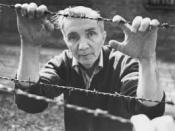
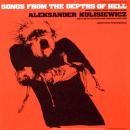

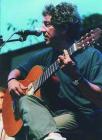
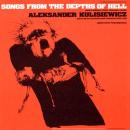
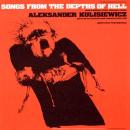

Musica: Rudi Goguel / Hanns Eisler
Music: Rudi Goguel / Hanns Eisler
Lyrics / Testo: Johann Esser/Wolfgang Langhoff, Aleksander Kulisiewicz, Maria Montuoro
Folkways Records Album N° FSS 37700 (1979)
PDF Booklet Available
Annotated by Peter Wortsman
La copertina dell'album, ispirata a questa canzone, è di Gertrude Degenhardt, moglie di Franz-Josef Degenhardt.
The album cover, inspired by this song, is by Gertrude Degenhardt, Franz-Josef Degenhardt's wife.
Aleksander Kulisiewicz (1918-1982) was a law student in German-occupied Poland when, in October 1939, he was denounced for anti-fascist writings, arrested by the Gestapo, and sent to the Sachsenhausen concentration camp, near Berlin. An amateur singer and songwriter, Kulisiewicz composed 54 songs during nearly six years of imprisonment at Sachsenhausen. After liberation he remembered his songs, as well as those learned from fellow prisoners, dictating hundreds of pages of text to his attending nurse at a Polish infirmary.
International hymn.
Music: The first three verses derive from the famous song Die Moorsoldaten (The Peat Bog Soldiers) written by Rudi Goguel in 1933. Music to the fourth verse taken from Hanns Eisler's musical revision of the same song, written in 1933.
Words: First verse by Johann Esser and Wolfgang Langhoff in 1933. Second, third and fourth verse by Aleksander Kulisiewicz. Last two lines taken from the song “Sul suolo desolato”, written by Maria Montuoro, an Italian prisoner in the concentration camp Ravensbrück (50 miles north of Berlin).
At the end of 1944 in the concentration camp Sachsenhausen, an attempt was made by prisoners to write an international concentration camp hymn. The song mentions the names of many camps and was intended to show how vast was the scheme and scope of the SS system of slavery.
Nell'inno si nomina un gran numero di campi di concentramento, per mostrare quanto vasto fosse il progetto del sistema schiavistico delle SS.
Nel raro video allegato a questa pagina, Aleksander Kulisiewicz canta al canzone al festival di Waldeck, nella DDR, nel 1967. La canta in tutte le lingue previste, che del resto conosceva alla perfezione. La introduce in tedesco, e in tedesco è pure l'aggiunta finale dove traduce i versi italiani finali di Maria Montuoro. Kulisiewicz ebbe a dichiarare: "Sono sopravvissuto all'epoca nazista, ma dal lager non sono mai uscito." [RV]